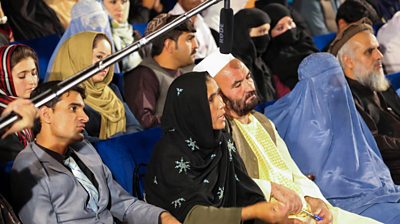Downloads
Publication date: January 2017
The projects
Under a five-year UK Department for International Development-funded global grant that started in November 2011, 91�ȱ� Media Action delivered governance projects in ten countries: Afghanistan, Bangladesh, Kenya, Myanmar, Nepal, Nigeria, the Palestinian Territories, Sierra Leone, Tanzania and Zambia. These projects included producing media programmes that sought to contribute to more accountable state-society relations and societies more resilient to conflict. They used both factual (debate, discussion and magazine) and drama formats, and broadcast programmes on a variety of media platforms (local and national TV and radio, and online).
Research approach
91�ȱ� Media Action completed qualitative research with audiences in all ten countries at various points during the projects’ cycles (baseline, midline and endline). It also carried out additional qualitative research in selected countries with experts from the media, governance and civil society sectors to explore people’s views of accountability further. This summary draws together findings from more than 30 of these studies.
Project context
At the outset of the global grant, each of the ten countries had very different governance and media contexts. A common need identified in all was the lack of effective mechanisms for citizens to interact with and question leaders.
Key findings
Audience engagement
-
Audiences and experts agreed that 91�ȱ� Media Action’s media programmes provided in-depth information and constructive dialogue on important governance issues. Audiences often said that the relevant and appropriate topics covered were a key reason for them watching or listening to programmes.
-
Factual programmes offered audiences the opportunity to see and hear people like them question and challenge those in power. They provided citizens with access to leaders and a safe forum through which to question them on issues that mattered.
- Dramas where able to role model positive attitudes and behaviours related to citizens’ role in community decision-making.
Influencing the drivers of accountability
- Underpinning 91�ȱ� Media Action’s approach to governance is the understanding that several individual outcomes (knowledge, interpersonal discussion and efficacy) are key drivers in improving accountability. The qualitative research provided valuable insights into the ways programmes influenced these drivers.
- Knowledge: Audiences reported improved and more in-depth knowledge of key issues, as well as a better understanding of their rights and the processes for holding leaders to account.
- Interpersonal discussion: Viewers and listeners described how improvements in their knowledge made them more confident to discuss these issues and said that they would talk about what they had seen or heard in the programmes with others.
- Empowerment to question: Seeing people like them question those in power within the programmes positively influenced viewers and listeners’ motivation and confidence to take similar action in their own lives.
Improving accountability
The research further highlighted the ways in which media programmes contributed to improved accountability.
- Programmes empowered people by providing trusted, balanced information on relevant issues. By ensuring diverse audience participation they were able to challenge restrictive norms about who can participate in decision-making and demonstrate how everyone can take part.
- The shows created space by providing a forum for constructive dialogue between citizens and leaders where people were able to challenge leaders and share opposing views without fear of recrimination.
- Audiences and experts described how the programmes were able to influence those in power by ensuring leaders were aware of the issues and priorities of citizens and by demonstrating and reinforcing the responsibility that those in power had to account for their decisions and actions.
Implications
The positive nature of the discussion in many of the factual programmes raised audiences’ expectations that action would be taken to resolve problems as a result. At the same time, audiences and experts expressed mixed satisfaction with the answers provided by participating panellists and general cynicism regarding government responsiveness.
Consequently, both audiences and experts sometimes felt that without additional follow-up to ensure that action is taken after the programmes, there remains a limit to the direct role that these media programmes can play in holding leaders to account.
